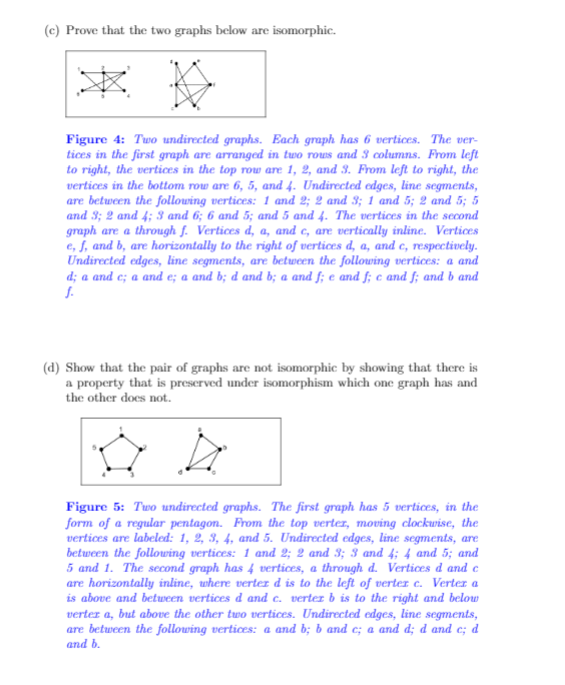Prove that the two graphs below are isomorphic. Figure 4: Two undirected graphs. Each graph has 6 vertices. The ver- tices in the first graph are arranged in two rous and 3 columns. From left to right, the vertices in the top row are 1, 2, and 3. From left to right, the vertices in the bottom row are 6, 5, and 4. Undirected edges, line segments, are between the following vertices: 1 and 2; 2 and 3; 1 and 5; 2 and 5; 5 and 3; 2 and 4; 3 and 6; 6 and 5; and 5 and 4. The vertices in the second graph are a through f. Vertices d, a, and c, are vertically inline. Vertices
Prove that the two graphs below are isomorphic. Figure 4: Two undirected graphs. Each graph has 6 vertices. The ver- tices in the first graph are arranged in two rous and 3 columns. From left to right, the vertices in the top row are 1, 2, and 3. From left to right, the vertices in the bottom row are 6, 5, and 4. Undirected edges, line segments, are between the following vertices: 1 and 2; 2 and 3; 1 and 5; 2 and 5; 5 and 3; 2 and 4; 3 and 6; 6 and 5; and 5 and 4. The vertices in the second graph are a through f. Vertices d, a, and c, are vertically inline. Vertices
Algebra and Trigonometry (MindTap Course List)
4th Edition
ISBN:9781305071742
Author:James Stewart, Lothar Redlin, Saleem Watson
Publisher:James Stewart, Lothar Redlin, Saleem Watson
Chapter1: Equations And Graphs
Section1.2: Graphs Of Equations In Two Variables; Circles
Problem 5E: a If a graph is symmetric with respect to the x-axis and (a,b) is on the graph, then (,) is also on...
Related questions
Concept explainers
Contingency Table
A contingency table can be defined as the visual representation of the relationship between two or more categorical variables that can be evaluated and registered. It is a categorical version of the scatterplot, which is used to investigate the linear relationship between two variables. A contingency table is indeed a type of frequency distribution table that displays two variables at the same time.
Binomial Distribution
Binomial is an algebraic expression of the sum or the difference of two terms. Before knowing about binomial distribution, we must know about the binomial theorem.
Topic Video
Question
problem c and d

Transcribed Image Text:(c) Prove that the two graphs below are isomorphic.
Figure 4: Two undirected graphs. Each graph has 6 vertices. The ver-
tices in the first graph are arranged in two rous and 3 columns. From left
to right, the vertices in the top row are 1, 2, and 3. From left to right, the
vertices in the bottom row are 6, 5, and 4. Undirected edges, line segments,
are between the following vertices: 1 and 2; 2 and 3; 1 and 5; 2 and 5; 5
and 3; 2 and 4; 3 and 6; 6 and 5; and 5 and 4. The vertices in the second
graph are a through f. Vertices d, a, and c, are vertically inline. Vertices
e, f, and b, are horizontally to the right of vertices d, a, and c, respectively.
Undirected edges, line segments, are between the following vertices: a and
d; a and e; a and e; a and b; d and b; a and f; e and f; c and f; and b and
J.
(d) Show that the pair of graphs are not isomorphic by showing that there is
a property that is preserved under isomorphism which one graph has and
the other does not.
Figure 5: Two undirected graphs. The first graph has 5 vertices, in the
form of a regular pentagon. From the top vertez, moving clockwise, the
vertices are labeled: 1, 2, 3, 4, and 5. Undirected edges, line segments, are
between the following vertices: 1 and 2; 2 and 3; 3 and 4; 4 and 5; and
5 and 1. The second graph has 4 vertices, a through d. Vertices d and c
are horizontally inline, where vertez d is to the left of vertez c. Verter a
vertez a, but above the other two vertices. Undirected edges, line segments,
are between the following vertices: a and b; b and c; a and d; d and c; d
and b.
Expert Solution
This question has been solved!
Explore an expertly crafted, step-by-step solution for a thorough understanding of key concepts.
This is a popular solution!
Trending now
This is a popular solution!
Step by step
Solved in 3 steps with 4 images

Knowledge Booster
Learn more about
Need a deep-dive on the concept behind this application? Look no further. Learn more about this topic, advanced-math and related others by exploring similar questions and additional content below.Recommended textbooks for you

Algebra and Trigonometry (MindTap Course List)
Algebra
ISBN:
9781305071742
Author:
James Stewart, Lothar Redlin, Saleem Watson
Publisher:
Cengage Learning

Algebra & Trigonometry with Analytic Geometry
Algebra
ISBN:
9781133382119
Author:
Swokowski
Publisher:
Cengage

Algebra for College Students
Algebra
ISBN:
9781285195780
Author:
Jerome E. Kaufmann, Karen L. Schwitters
Publisher:
Cengage Learning

Algebra and Trigonometry (MindTap Course List)
Algebra
ISBN:
9781305071742
Author:
James Stewart, Lothar Redlin, Saleem Watson
Publisher:
Cengage Learning

Algebra & Trigonometry with Analytic Geometry
Algebra
ISBN:
9781133382119
Author:
Swokowski
Publisher:
Cengage

Algebra for College Students
Algebra
ISBN:
9781285195780
Author:
Jerome E. Kaufmann, Karen L. Schwitters
Publisher:
Cengage Learning

Linear Algebra: A Modern Introduction
Algebra
ISBN:
9781285463247
Author:
David Poole
Publisher:
Cengage Learning

College Algebra (MindTap Course List)
Algebra
ISBN:
9781305652231
Author:
R. David Gustafson, Jeff Hughes
Publisher:
Cengage Learning